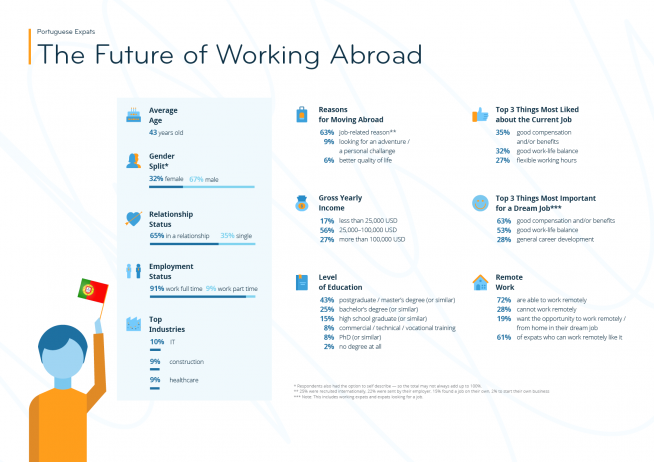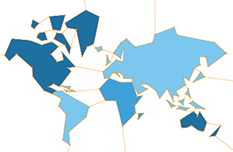A Good Income and Work-Life Balance Are Important to Portuguese Expats
Why do Portuguese nationals move abroad? According to the Expat Insider 2021 survey by InterNations, 63% of Portuguese expats working abroad name their career as the most important reason for relocating to another country. This is 16 percentage points more than the global average: 47% of expats worldwide moved abroad for work-related reasons. Most of the Portuguese survey respondents who work abroad were recruited internationally (25%), which is also a substantially higher share than the global average (15%). This is followed by 22% being sent by their employer (vs. 13% globally) and 15% who found a job on their own (vs. 17% globally). Just 2% moved abroad to start their own business.
The Typical Portuguese Expat Working Abroad
The average Portuguese expat working abroad is 43 years old. While globally, the gender ratio among working expats is split more or less evenly (53% male and 46% female), there is a much higher share of male (67%) rather than female (32%) expats from Portugal. More than nine in ten (91%) work full time, while this is just the case for 82% of working expats worldwide.
The most common fields of work among Portuguese expats are IT (10%) and the construction industry (9%). The latter is quite uncommon among expats globally — just 3% work in this field. Additionally, nearly one in ten Portuguese respondents working abroad (9%) have a job in healthcare, which is also more than the global average (6%). On the other hand, Portuguese expats are underrepresented in the field of education: just 5% work in this sector (vs. 12% globally).
A Sharp Divide in the Levels of Education
The biggest share of Portuguese nationals working abroad (43%) has a postgraduate degree / master’s degree, which is slightly less than the global average (47%). Another quarter (25%) cites a bachelor’s degree as their highest level of education (vs. 33% globally). While the share of those holding a PhD is the same as the global average (8% each), the share of Portuguese expats working abroad with a high school diploma only is three times as high (15% vs. 5% globally).
Nevertheless, 37% work in a senior or specialist position (vs. 30% globally), and 17% are top managers / executives (vs. 13% globally). However, more than one in five (21%) also work in lower/middle management (vs. 17% globally). Lastly, Portuguese expats are less likely to have their own business (4% vs. 7% globally) or to be self-employed / freelancers (8% vs. 11% globally).
High Job Security and Good Career Opportunities Compared to Home
More than three-quarters of Portuguese expats (77%) are satisfied with their job in general. They even express above-average satisfaction with many factors related to their working life, especially when it comes to job security (78% vs. 67% globally) and the local career opportunities (60% vs. 49% globally).
The high satisfaction level can be explained with the most common destinations for Portuguese nationals working abroad: the United Kingdom, Switzerland, Spain, the Netherlands, and Germany. Aside from Spain, all destinations rank ahead of Portugal in the Working Abroad Index of the Expat Insider 2021 survey. Expats in these countries also rate the local career opportunities and their job security much better than in Portugal.
A Good Compensation, a Decent Work-Life Balance, and Flexible Hours
When asked what they like most about their current job, 35% of Portuguese expats cite the good compensation and/or good benefits. Exactly three in ten (30%) have a gross yearly income between 50,000 and 100,000 USD. More than a quarter (27%) make more than 100,000 USD per year (vs. 23% globally), while 43% make less than 50,000 USD (vs. 44% globally).
The second-most frequently mentioned factor which they appreciate about their current job is a good work-life balance (32%), followed by flexible working hours (27%). In fact, about three out of four (74%) are happy with their working hours (vs. 70% globally), and 75% rate their work-life balance positively (vs. 68% globally). They view these factors favorably even though the average working hours per week for all Portuguese respondents working abroad (42.2 hours) are higher than the global average (39.9 hours).
Remote Work Is Not That Important to Portuguese Expats
Interestingly, just 24% of Portuguese respondents working abroad rank the opportunity to work remotely / from home as one of the best aspects of their current job. On a global scale, 32% of working expats choose this option. On the one hand, this could be related to the fact that just 61% of Portuguese expats who are currently able to work remotely actually like doing so, which is lower than the share among all expats worldwide (65%).
On the other hand, the share of Portuguese expats who are able to work remotely in the first place (72%) is also lower than the global average (78%). Globally, 62% of expats say that they can work remotely, but this is the case for just 55% of Portuguese expats. Another 16% can work remotely but usually prefer not to, which is on par with the global average (16%), and 21% are unable to work remotely due to the nature of their job (vs. 16% globally). The latter result is probably related to Portuguese respondents being overrepresented in sectors such as healthcare and construction.
The COVID-19 pandemic has had some impact on the remote-work policies for Portuguese expats, though: One-third (33%) is now able to work remotely more often than before COVID-19, compared to 28% globally. However, quite a few Portuguese expats might not really care about these changes since the opportunity to work remotely / from home is not important to them in an ideal work environment. When asked about their dream job, just 19% said that this aspect would be highly relevant for them.
The Dream Job Wish List for Portuguese Expats
What really matters to Portuguese expats is a good compensation and/or good benefits: more than three in five (63%) mention this factor as an important aspect in an ideal work environment, nine percentage points more than the global average (54%). Additionally, the prospect of a good work-life balance (53% vs. 49% globally) and general career development opportunities (28% vs. 20% globally) are more important to Portuguese expats than to the global average.
“Having a secure job and a good income, while maintaining a healthy work-life balance, seems to be the dream for many Portuguese expats working abroad,” says Malte Zeeck, InterNations Founder and Co-CEO. “They value these traditional aspects of what is considered a ‘good’ job more than more modern ones such as having creative tasks, flexible working hours, and room for personal growth.”
In fact, just 24% of Portuguese expats working abroad cite creative/interesting tasks as important when imagining their dream job, compared to 29% globally. Moreover, flexible working hours (22% vs. 28% globally) and room for personal development / growth (20% vs. 22% globally) matter somewhat less to them than to the average working expat worldwide.
Modern Ways of Working Are Important in the Countries They Now Live In
Interestingly, Portuguese expats tend to work in countries where factors like autonomy, freedom, creativity, personal development, and self-fulfillment do play an important role in the local business culture. These values are closely related to the concept of New Work, which describes the new way of working in the global and digital age. The UK and Switzerland, which are the two most common destinations for Portuguese expats working abroad, both rank ahead of Portugal with regard to expats comparing the importance of New Work in the local business culture.
The UK comes 15th out of 55 countries and Switzerland ranks 23rd, while Portugal lands in 28th place. The Netherlands, which is the third most common destination for Portuguese nationals working abroad, even ranks among the top 10 countries worldwide (5th). On the other hand, expats find that these values are even less important in Germany (35th) and Spain (48th) than in Portugal. Overall, 53% of Portuguese expats working abroad say that the factors related to New Work are more important in the business culture of the country they now live in than back home Portugal. On a global scale, just 49% of expats say the same about their respective host and home countries.




